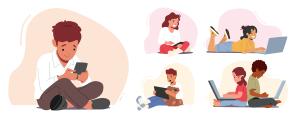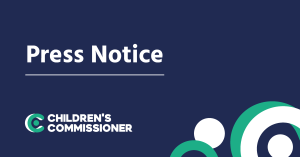An abridged version of the below blog appeared in The Sun’s Fab Daily column on September 7th.
As Children’s Commissioner I’ve heard from more than a million young people and been utterly shocked to hear from primary school aged children that they’ve seen extreme content online like porn, violence and other inappropriate content.
Children across England talk to me about their hopes and ambitions for the future, as well as their concerns. One issue that comes up very often is online safety and their worries about protecting themselves online. Keeping children safe online is an issue shared by parents, teachers and one of my top priorities.
We wouldn’t let young children wander the streets alone because of the threat of physical danger – but we are inadvertently turning a blind eye to the threat of the online world by letting our children explore the internet often unsupervised and unprotected. We are so attuned to the risks to our children out on the streets or in society more broadly that we might be overlooking the biggest threat, far closer to home and ever present in our homes: the phone in our young people’s pockets.
It’s clear in speaking to children that social media and the online world is an integral part of their young lives. This is a generation that has grown up online, they’ve never known a world without social media, smartphones and instant, 24-hour communication. This has brought a world of benefits; never before has a generation been so connected and well-informed.
Yet the online world, where so much of childhood is now spent, is not designed with children’s safety, wellbeing and best interests in mind. That’s why it must be all our responsibility to understand what it is like to grow up online.
While there are positives to the online world, allowing children to learn, play and explore, it comes hand in hand with very real risks and harms when children are left unprotected online. Parents can no longer bury their heads in the sand saying they do not understand the online world – the genie is out of the bottle.
I have been shocked by some of the things children have told me about their online experiences. Girls as young as nine have told my team about strangers asking for their home address online. And in a room of 15 and 16-year-olds, three quarters had been sent a video of a beheading.
My research has found that children are frequently exposed to a wide range of inappropriate and harmful content online, including sexualised and violent imagery, anonymous trolling, and material that promotes suicide, self-harm and eating disorders. This type of horrific content stays online too long and is available too frequently, even when reported to platforms.
In a survey I commissioned, around half of children told me they had seen online content they felt was inappropriate or made them feel worried or upset, with boys more likely than girls to have seen harmful content. While children will always be curious, most told me they rarely sought out this content. Instead, it was promoted and offered to them by highly complex recommendation algorithms, which are designed to capture and retain their attention.
It was clear from my Big Ambition survey that children have both positive and negative experiences online, and they do not see a difference between their online and offline worlds. Children were also explicit in their desire for better protection online.
There’s no doubt – children are digital pioneers. They know how to navigate the online world seamlessly. They have witnessed first-hand the evolution of social media from a light-hearted and fun environment, to one which is becoming increasingly toxic and is not protecting them online. And that’s why they need our help.
I asked a group of young people what they wish their parents had known and they told me that they are seeing content, it’s everywhere, to keep checking in and asking even if they seem disinterested and that they might need to talk through some of the tougher stuff they see.
We all have a duty to step up – even when the internet can seem like a mysterious place. We need to understand what is happening in the far corners of the online wild west. It can be tough but as adults we need to set boundaries when it comes to the internet. We need to keep talking to our children about what they are seeing online – even if children are initially resistant to sharing. We need to make sure that mobile phones aren’t left in bedrooms overnight and I would always urge parents not to leave children for too long online without supervision.
As parents we must play our part, being vigilant to the risks their children face online. It’s vital that parents use the tools available to them, including child safety settings, and have open and honest conversations with children about boundaries. They must also continue to ask their children what they are up to online, even if their children try and give them the brush off.
At the moment, I think that our children are being failed – and they know it too. They know tech companies are not doing enough to protect them online. The Children’s Code was an opportunity to right these wrongs; I hope that it will be strengthened to hold tech firms to account.
Years have gone by and it’s clear that self-regulation by tech companies doesn’t work. All too often they downplay children’s experiences on their sites, putting profits before our children’s safety. It’s quite clearly not good enough. And our children deserve better, they deserve to explore the online world and be safe. They can be digital pioneers, but we need to help them to navigate the online world so it’s no longer the wild west.
Children can help us by sharing their experiences – we then all need to listen to what they say and act. It’s all of our responsibilities but there’s far more that decision makers, especially the tech companies, must do at pace. I want a far greater sense of urgency from the government and social media bosses with children’s voices ringing loudly in their ears.
No child should ever see pornography or any other deeply disturbing content at any age – let alone when they are in primary school.





